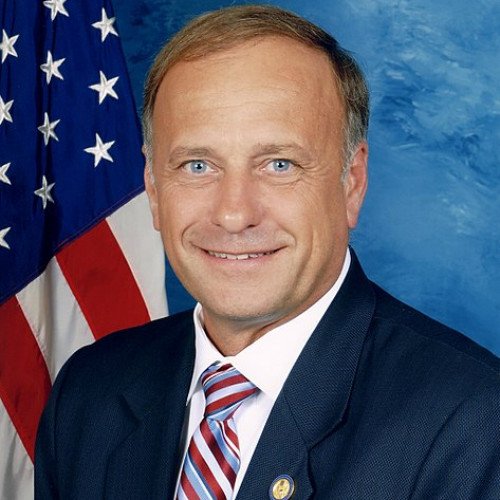Hillary Clinton VS Steve King

Hillary Clinton
Hillary Diane Rodham Clinton (née Rodham; born October 26, 1947) is an American politician, diplomat, lawyer, writer, and public speaker who served as the 67th United States secretary of state from 2009 to 2013, as a United States senator from New York from 2001 to 2009, and as First Lady of the United States from 1993 to 2001. Clinton became the first woman to be nominated for president of the United States by a major political party when she won the Democratic Party nomination in 2016. She was the first woman to win the popular vote in an American presidential election, which she lost to Donald Trump. Raised in the Chicago suburb of Park Ridge, Clinton graduated from Wellesley College in 1969 and earned a Juris Doctor from Yale Law School in 1973. After serving as a congressional legal counsel, she moved to Arkansas and married future president Bill Clinton in 1975; the two had met at Yale. In 1977, she co-founded Arkansas Advocates for Children and Families. She was appointed the first female chair of the Legal Services Corporation in 1978 and became the first female partner at Little Rock's Rose Law Firm the following year. The National Law Journal twice listed her as one of the hundred most influential lawyers in America. Clinton was the first lady of Arkansas from 1979 to 1981 and again from 1983 to 1992. As First Lady of the United States, Clinton advocated for healthcare reform. In 1994, her major initiative—the Clinton health care plan—failed to gain approval from Congress. In 1997 and 1999, Clinton played a leading role in advocating the creation of the State Children's Health Insurance Program, the Adoption and Safe Families Act, and the Foster Care Independence Act. Clinton advocated for gender equality at the 1995 UN conference on women. Her marital relationship came under public scrutiny during the Lewinsky scandal, which led her to issue a statement that reaffirmed her commitment to the marriage. In 2000, Clinton was elected as the first female senator from New York. She was re-elected in 2006 and chaired the Senate Democratic Steering and Outreach Committee from 2003 to 2007. During her Senate tenure, Clinton advocated for medical benefits for first responders whose health was damaged in the September 11 attacks. She supported the resolution authorizing the Iraq War in 2002 but opposed the surge of U.S. troops in 2007. In 2008, Clinton ran for president but was defeated by eventual winner Barack Obama in the Democratic primaries. Clinton was U.S. secretary of state in the first term of the Obama Administration from 2009 to 2013. During her tenure, Clinton established the Quadrennial Diplomacy and Development Review. She responded to the Arab Spring by advocating military intervention in Libya but was harshly criticized by Republicans for the failure to prevent or adequately respond to the 2012 Benghazi attack. Clinton helped to organize a diplomatic isolation and a regime of international sanctions against Iran in an effort to force it to curtail its nuclear program; this effort eventually led to the multinational JCPOA nuclear agreement in 2015. Her use of a private email server when she was Secretary of State was the subject of intense scrutiny; while no charges were filed against Clinton, the email controversy was the single most covered topic during the 2016 presidential election. Clinton made a second presidential run in 2016. After winning the Democratic nomination, she ran in the general election with Virginia senator Tim Kaine as her running mate. Clinton lost the presidential election to Republican opponent Donald Trump in the Electoral College despite winning a plurality of the popular vote. Following her loss, she wrote her third memoir, What Happened, and launched Onward Together, a political action organization dedicated to fundraising for progressive political groups. She is the current chancellor of Queen's University Belfast in Belfast, Northern Ireland.
Statistics for this Xoptio

Steve King
Steven Arnold King (born May 28, 1949) is an American politician and former businessman who served as the U.S. Representative for Iowa's 4th congressional district from 2003 to 2021. A member of the Republican Party, he represented Iowa's 5th congressional district until redistricting. Born in 1949 in Storm Lake, Iowa, King attended Northwest Missouri State University from 1967 to 1970 but left without graduating. He founded a construction company in 1975 and worked in business and environmental study before seeking the Republican nomination for a seat in the Iowa Senate in 1996. He won the primary and the general election, and was reelected in 2000. In 2002 King was elected to the U.S. House of Representatives from Iowa's 5th congressional district after the incumbent, Tom Latham, was reassigned to the 4th district after redistricting. He was reelected four times before the 2010 United States Census removed the 5th district and placed King in the 4th, which he represented from 2013. King is an opponent of immigration and multiculturalism, and has a long history of racist and anti-immigrant rhetoric and white-nationalist affiliations. The Washington Post described King as "the Congressman most openly affiliated with white nationalism." King has been criticized for alleged affiliation with white supremacist ideas, and has made controversial statements against immigrants, and supported European right-wing populist and far-right politicians accused of racism and Islamophobia.For much of King's congressional tenure, Republican politicians and officials were silent about his rhetoric, and frequently sought his endorsement and campaigned with him because of his popularity with northwest Iowa's conservative voters. Shortly before the 2018 election, the National Republican Congressional Committee withdrew funding for King's reelection campaign and its chairman, Steve Stivers, condemned King's conduct, although Iowa's Republican senators and governor continued to endorse him. King was reelected, but after a January 2019 interview in which he questioned the negative connotations of the terms "white nationalist" and "white supremacy", he was widely condemned by both parties, the media and public figures, and the Republican Steering Committee removed him from all House committee assignments. King ran for reelection but, campaign funding and support having declined, lost the June 2020 Republican primary to Randy Feenstra.